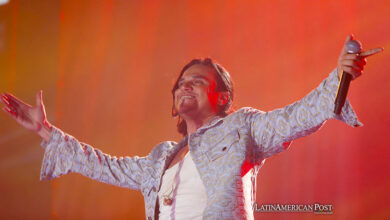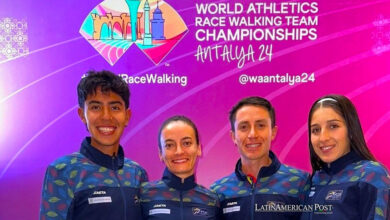Countdown to the Oscars: BlacKkKlansman
Listen this article
Maybe this year will Spike Lee finally win his well-deserved Oscar. Here are some notes about his latest movie: BlacKkKlansman

BlacKkKlansman is the latest Spike Lee movie. This director is known for making films of African-American revindication that denounces racism. He is interested in the black history of the United States and its influence on this country's culture. He has never won an Oscar, but in 2016 he was honored for his career in the industry. This year he returns with this film that is nominated in three categories: Best Adapted Screenplay, Best Director and Best Film.
Leer en español: Cuenta regresiva para los Óscar: BlacKkKlansman
Comedy as a covert operation
The protagonist of BlacKkKlansman is Ron, the first black cop in Colorado Springs. Set in 1979, this film tells how Ron and his fellow Flip, a Jew, create between the two a character that will infiltrate the local Ku Klux Klan to dismantle the organization from within and combat systematic racism. Being a black policeman trying to infiltrate an organization that hates blacks, Ron is faced with a lot of funny situations in the middle of his mission. However, this comedy is far from being a naive one. Very much in Lee's style, this film manages to make us laugh as well as cry tears as he shows us how Flip and Ron become friends in the mission and how, in the game of being both the same person, they approach and empathize with each other. Flip, in addition, is getting involved little by little and taking personal the mission to understand that although he is white, this problem also affects him, because he is faced with his condition as a Jew and the situation of having to deny it.
In addition, the film does not use the comic genre to lighten the problem it deals with but to mock and question the dynamics of power. Far from being naive, BlacKkKlansman complicates the dilemma in which Ron is involved between being a policeman and being a black man victim of the systematic racism that is found even in the heart of the institution in which he works. So, opposed to the funny scenes in which we see Ron talking on the phone with members of the Klan saying he hates blacks, others are added in which he must defend the police among his brothers and sisters of the Black Panthers, even if he knows it is a racist institution. These contradictions that lead to a funny absurdity, at the same time, are complicating the situation in which Ron finds himself.
There are three covert operations in the film: 1) the obvious: Ron infiltrates the Klan; 2) what Ron does without realizing: being a black man infiltrated in the police, the second most racist institution after the Klan, to fight it from within; 3) Finally, the film itself is infiltrated in the public: it is disguised as a comedy and disarms us with its jokes, in the end forcing us to take charge of the awkward truth: that this is not a phenomenon of 1979 but of the present.
Comedy is, then, an instrument to inconvenience the power. This is seen, as already said, in the contradictions of the character, which, by the way, are tensions that the film does not intend to solve but to leave on the table, and also to ridiculize the members of the Klan. Spike Lee achieves, with a sharp as well as simple sense of humor, to make fun of all the racist characters in the film. Within the Ku Klux Klan there are characters in all the ridiculous ways: the paranoid, the slow, the naive, the absurdly passionate and, most of all, the leader: the character of David Duke, played by Topher Grace, which is a joke from beginning to end and is the one that the police officers have fooled the most. In the end, Duke is completely ridiculed to have to pose with a black police officer in charge of his security and to learn that he has talked all the time with a black man and a Jew, because he was not able to recognize either of them, even when he had them in front of him. This highlights the absurdity of racism and anti-Semitism: David Duke is not able to recognize those he hates so much because in the end we are not so different. The character of Duke is as caricatured as Donald Trump and the film manages to make this parallel, especially in the epilogue.
Read also: Oscar Awards: race in imagined times
The fight with no way out
As Ron carries out his mission, he falls in love with Patrice, a passionate civil rights activist who is president of the African American Student Association. After leaving a Black Panthers' meeting, Ron and Patrice went partying and dancing. This scene is recorded in slow motion, a sharp contrast to the rest of the film, which has sudden jumps and runs quickly. The tape stops at the party scene to show this other side of the fight. It will also be seen later in the conversations between Ron and Patrice, in which she cannot stop talking about politics and shows him how all aspects of life (dancing, falling in love, cinema) have to do with the struggle for black liberation. Thus, even partying, dancing and friendships are political and compassion gestures. There is not outside of the political struggle.
[Spoiler alert!] The film ends with an epilogue consisting of archive images of the marches at Charlottesville in 2017, speeches by the real David Duke and Donald Trump. With this gesture, Spike Lee not only makes a parallel between the president of the United States and the ridiculous character of Duke, but also shows us how this we just laughed at is not something from the past, but something we have to deal with here and now, therefore, again, we are not out of racism or the struggle for equality even when we sit down to watch a movie.
Read also: Countdown to the Oscars: Black Panther
LatinAmerican Post | Staff Pabón
Translated from "Cuenta regresiva para los Óscar: BlacKkKlansman"




